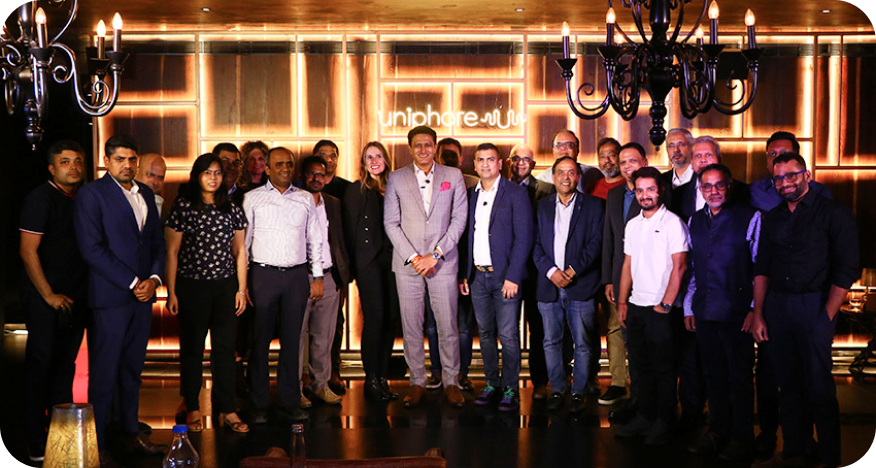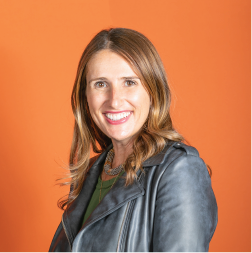What do technology, leadership and cricket all have in common? Quite a lot, actually. Earlier this month, attendees of our premier customer session in Bangalore, India enjoyed a rare treat as cricket legend Anil Kumble joined Uniphore Co-founder and President APAC, Ravi Saraogi, and I on the main stage of Impact 2022. We discussed tech innovation, entrepreneurship and what it takes to lead—on the field and in the industry. Here are 5 key takeaways from our conversation that you won’t want to miss:
Achieving Greatness Takes Grit, Passion and Perseverance
Whether you’re changing a game or transforming an industry, any endeavor worth pursuing has its share of challenges. From hard losses to tough critics—including yourself—it’s easy to lose faith or focus. However, what sets champions apart is the will to double down and work even harder in the face of adversity. “Every game, you’re on the block to perform,” Kumble says. “And you’re only as good as your last innings or the last game.” The key to pushing through, he says, is to focus on the task at hand. “I never believed that the match was over until the last ball was bowled.”
That laser focus made Kumble one of cricket’s foremost players. But his passion for the sport—and, more importantly, his team—is what made him a legend. When others looked up to him, they saw a natural leader whose personal grit and dedication inspired them to be better versions of themselves.
“The one thing I ensure, whether we win or lose, the fighting spirit will always be there,” Kumble says. “When you’re a bowler, you are the person who’s writing the script. You’re narrating the story to the rest of the players. And if my own teammates look at me fighting, they will also be better. It’s a team game, and the only way you can win against an opponent is if you play as a team. You can’t just win as an individual.”
It’s a team game, and the only way you can win against an opponent is if you play as a team. You can’t just win as an individual.
Anil Kumble, Cricket Legend
That team-first mindset translates to the tech world too. Saraogi shared how he and fellow Uniphore Co-founder and CEO, Umesh Sachdev, shouldered the bulk of responsibilities in the company’s early days. However, it wasn’t until they started building a team of leaders as dedicated and passionate as they were, that the company started showing signs of real success. Now, with more than 800 employees in 17 locations throughout the world, that success has risen to the global stage.
Self-Improvement Starts with Self-Discipline
Greatness itself isn’t a final result—it’s a journey; a product and process of ongoing self-improvement. However, for most people—athletes and business leaders alike—self-improvement doesn’t come naturally. Instead, it requires intense self-discipline. This means looking critically at one’s behaviors and actions and making a conscious effort to develop those that work and to correct those that don’t.
For Kumble, this process of self-improvement through self-discipline was a matter of routine—or, rather, routines. Whether bowling or batting, he developed a set of routines which he could easily analyze and fine-tune, as needed. “If things didn’t go well, it was easier for me to pinpoint which [routine] I was faltering in,” he says.
Equally important to his self-improvement was the feedback he received from other players—particularly those he played against. When bowling, if a particular approach didn’t work, he would make minute adjustments tailored to the player. Of the batsmen he faced, Kumble said, “they were my coaches.”
Athletes like Kumble aren’t the only ones who see routines as a critical component of self-discipline and, ultimately, self-improvement. Business leaders from Elon Musk to Sundar Pichai (who also happens to be a huge cricket fan) have attributed their productivity and even success to their daily routines.

Ambition is Greater than Resources
In sports and in life, challenges can come from within and from without. And one of the biggest challenges for those starting out is lack of resources. Going head-to-head against heavy hitters can be particularly daunting when you feel underfunded or underequipped. However, for players like Kumble (and companies like Uniphore), what they lacked in resources starting out, they made up for in resourcefulness. They used the tools they had—along with a healthy dose of grit and self-discipline—to develop their skills and grow—as individuals and as team leaders.
"It’s important to grow as an individual. It’s important to grow as an organization,” Saraogi says. “If you are where you are for the rest of the year—for 365 days—you’ll still be at day 1. But if you grow every day, say, one percent, you will have 37 times more impact as an individual."
Ravi Saraogi, Co-founder and President APAC Uniphore
A major part of that growth comes from coaching. Kumble shared how invaluable his coaches were to his personal growth and how he tried to pass along what he learned with those around him. Saraogi took a similar tack when co-building the team at Uniphore. “We thought, how do we institutionalize that across the organization: when each individual grows every day?” he asked. “That’s how you increase resourcefulness.”
The answer: by focusing on learning and development. By coaching others to look within for creative solutions to big challenges, Saraogi and his fellow Uniphore leaders built a culture of resourcefulness. Outside-the-box thinking is encouraged, and challenges are seen as opportunities to test new theories and applications. And it’s a culture that continues to this day, even as the company’s resources continue to grow.
The Best Coaches are the Best Communicators
Simply being a phenomenal player doesn’t automatically make one a great coach. To be truly effective, you have to surround yourself with equally dedicated leaders and teachers who know how to empower others to grow. “My approach to any coaching assignment I’ve had is to get a core group of people to decide as to how things should be done,” Kumble says. Those he chose were selected for their ability to engage with every team member to develop their skills and, ultimately, elevate the team.
"Communication is a major part of team success, and the only way that can happen is through engaging every player, every member in the group,” Kumble says. “That can only happen if you enable that kind of conversation. My job [as coach] was to enable those conversations."
Anil Kumble, Cricket Legend
Conversations are something that Saraogi knows well. After all, Uniphore’s unique approach to conversations—leveraging conversational AI and automation to unlock their full enterprise value—have earned it a reputation as the conversation expert. Even so, he acknowledges that opening the conversation up to others—and allowing them to learn and make mistakes along the way—was difficult after handling so much of the work for so many years.
“The hardest thing to do is to let go,” he says. “[But you have to] give the work to others, empower them, and let them make mistakes. It’s okay. As long as the intention is right and you put in the hard work, you’ll learn through it [as a team].”
Learning is key. Saraogi emphasizes the value of sharing stories—particularly of when things went wrong—in helping the team learn and, ultimately, grow. He gives a simple formula for outlining and analyzing such events: “I did this. This is how it did not work out. And here is how it worked out.” This way, even uncomfortable conversations add value to the team and can serve as a touchstone for improvement. “Sharing those stories, in a human way, goes a long way,” he says.
Advice to Entrepreneurs: Find Your North Star

Building on the importance of conversations, Saraogi encourages entrepreneurs to find a topic of focus—a North Star—that can set the tone and expectations for all subsequent business discussions. “It’s important to find that North Star to create your programs around and then prioritize,” he says, imploring startup leaders to constantly ask, “Is an action leading to that North Star or not?”
Measuring against that North Star requires data—something Uniphore is intimately familiar with. After all, artificial intelligence models require massive volumes of data to sample and synthesize. However, rich, scientific data isn’t exclusive to the AI industry. Kumble explained how a now-ubiquitous tool—the speed gun—reshaped how cricket was played and ignited a personal fascination with data-based technology. Commenting on the emergence of speed guns in the late 1990s, he said:
“Data was a crucial thing. It helped me a lot as a bowler. You know, I am a spinner—why should speed guns matter? But for me it was crucial, because I looked at the speeds I bowled in different matches. And if I knew that this particular speed on this pitch was troubling the batsman, then I need to do more of that.”
Building on his fascination with data, Kumble would later launch Spektacom, a startup company aimed at revolutionizing sporting experiences through state-of-the-art technology. “I had started [Spektacom] while I was playing, and we brought out analytical tools,” he explained. “There were no video tools. We did data [on] ball-by-ball scoring.” That early data-sourcing paved the way for developing the company’s flagship product: the Power Bat. Using AI and running on the Microsoft Azure cloud platform, this innovative tool uses a series of sensors to capture batting-related data points in real time to help players improve their game and give broadcasters and fans deeper insights into the sport.
Like Uniphore, Kumble started his company with a North Star concept—in this case, improving how the sport of cricket is played—and built a conversation around it. He then used data—from his product, from his team and from his customers—to measure against that central concept. And while digressions and distractions may alter the flow of the conversation, adhering to that constant—that North Star—is vital to entrepreneurial success.
Saraogi whole-heartedly agrees. He urges startup leaders to consider their central mission in every decision they make and everything they do. “That’s what, as the leadership team at Uniphore, we’re constantly talking about: is what we did impacting the North Star as we’ve defined it for that year, for that half-year, for that quarter, for that day.”
That’s how you win the game—whether you’re seated at the roundtable or playing on the oval.
)
 By
By